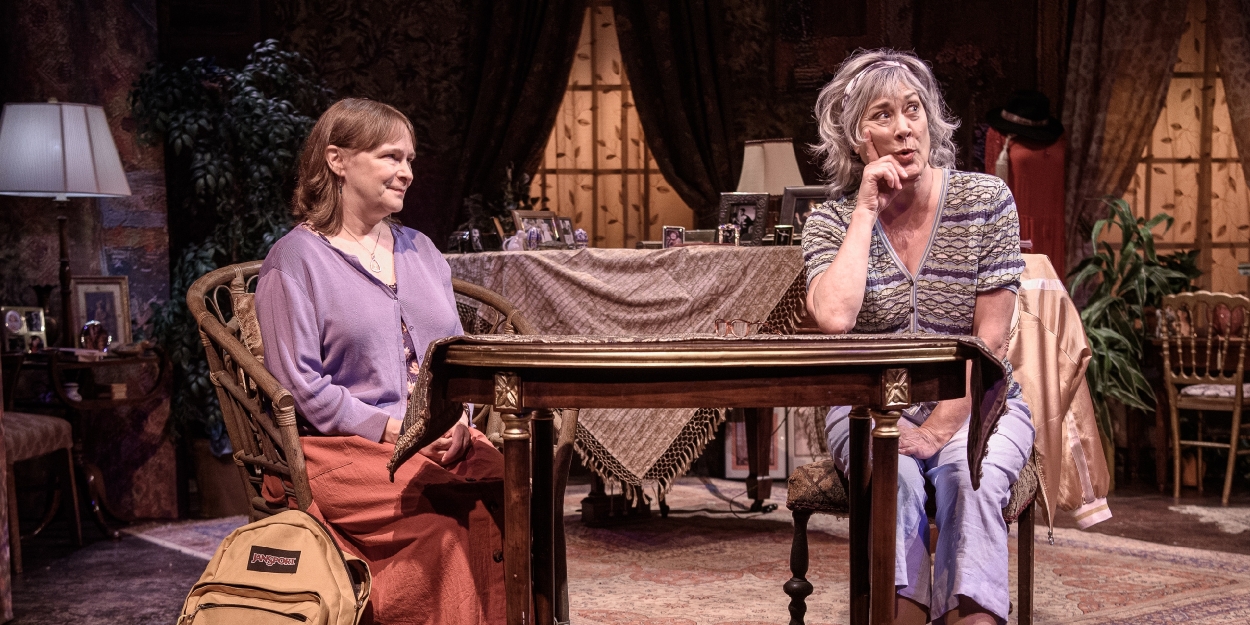Review: WHAT KEEPS US GOING at The Schoolhouse Theater
A Memory Play by Barbara Dana

Part way through her opening monologue as Marie in What Keeps Us Going at The Schoolhouse Theater (through June 9), actor Karen Ziemba (pictured right) suddenly stops, falters, starts to mouthe a word or two, but nothing comes out.
I sensed not being the only one in the audience momentarily confused and worried for the performer. Did something just happen to Ms. Ziemba?
No. It was just compellingly convincing acting by Ms. Ziemba, whose interpretation of the stage directions – “she freezes … long pause” – was frighteningly real.
That’s how playwright Barbara Dana dramatically yet elegantly establishes that this is a memory play – in more than one way. In the traditional sense of a memory play, it’s Ms. Dana’s roman a clef remembrance of her real-life friendship with celebrated stage and screen actor Elizabeth Wilson (here named Marie), whose late-in-life memory lapses form the fulcrum of this play.
Masterly essaying the opening scene, Ms. Ziemba doesn’t overplay it, she doesn’t underplay it, she simply plays it, perfectly.
And so it is with the entire cast in this production, directed cannily, as usual, by iconic theater maestro Austin Pendleton (of whom I always like to tell people, “He was Motel the Tailor in the original Fiddler on the Roof).
As theater intern Lily (surrogate for the real-life Barbara Dana), who is charged with assisting Marie to select a script excerpt for Marie to perform at a theater benefit, Amelia Campbell (pictured right) craftily manages her arc spanning an earthy journey from needy and insecure to boldly claiming her own agency as aspiring playwright.
A thoroughly marvelous turn by Tim Jerome as Hungarian plumber Laszlo provides gentle comic relief in the exchanges between him and Marie, which at times play like variations on the head-spinning Abbott and Costello sketch “Who’s on First.”
Anthony Arkin (son of Barbara Dana and the late Alan Arkin) gets the most out of his role as a frazzled artistic director trying to juggle more balls than he cares to handle. He tries soothingly and empathetically to buck up the frightened Marie – whose line memorization is deserting her – even as he himself is staring down his own demons.
It’s not only scripted text that haunts Marie’s faltering memory. As she says, ““I have to write everything down or I don’t know who I am.”
And lest we forget Addison, the adorable canine who plays Laszlo’s faithful pal Sanchez (whom Marie persists in mis-naming Sombrero and Maracas and anything other than Sanchez.)
What’s clear throughout is that the playwright is less concerned with story for story’s sake than with the the fraught emotional lives of her characters. She has the good fortune for those to be brought into dynamic existence by a cast of extremely fine actors.
A downturn in memory is not the only vicissitude of aging on Ms. Dana’s mind. A constant theme is the breakdown of our – ahem! – maturing physical plant, aka our body. There are recurring references to someone or other’s physical reconstruction – a hip, a pelvis, even dental care.
And then there is perhaps the saddest malady of all for humans of a certain age and situation – loneliness. Coursing throughout the dialogue is an undercurrent of isolation. Marie forever is urging whomever is about to leave not to leave.
Even the meticulously curated set design – early- to mid-20th Century, for lack of a finer description, and stuffed with all manner of objects, tapestries, plants – conveys someone who needs to be surrounded by things, living or otherwise.
To quote Marie, “I cannot begin to tell you how much a good friend can mean in a person’s life.”
So what does the play title mean? you well might ask. Interestingly, the appearance in the script of the words “what keeps us going” is (unlike the declarative play title) followed by a question mark.
When it is posed by Marie to Lily, the latter replies, “I don’t know.”
If you asked me, based on what is on Ms. Dana’s mind in her play, I’d say the simple answer is “People” keep us going, as in the warm-blooded caress of the human spirit. Plus hope. Plus possibility.
As Laszlo, with haunting memories of his childhood in war-torn Hungary, tells Marie as they bond closer and closer, “You can’t remember and I can’t forget. I will help you to remember and you will help me to forget.
Helping each other survive is what it’s all about, isn’t it? People. People who need people. As Lily might say, hey, that would make a good song lyric.
Reader Reviews

Videos

